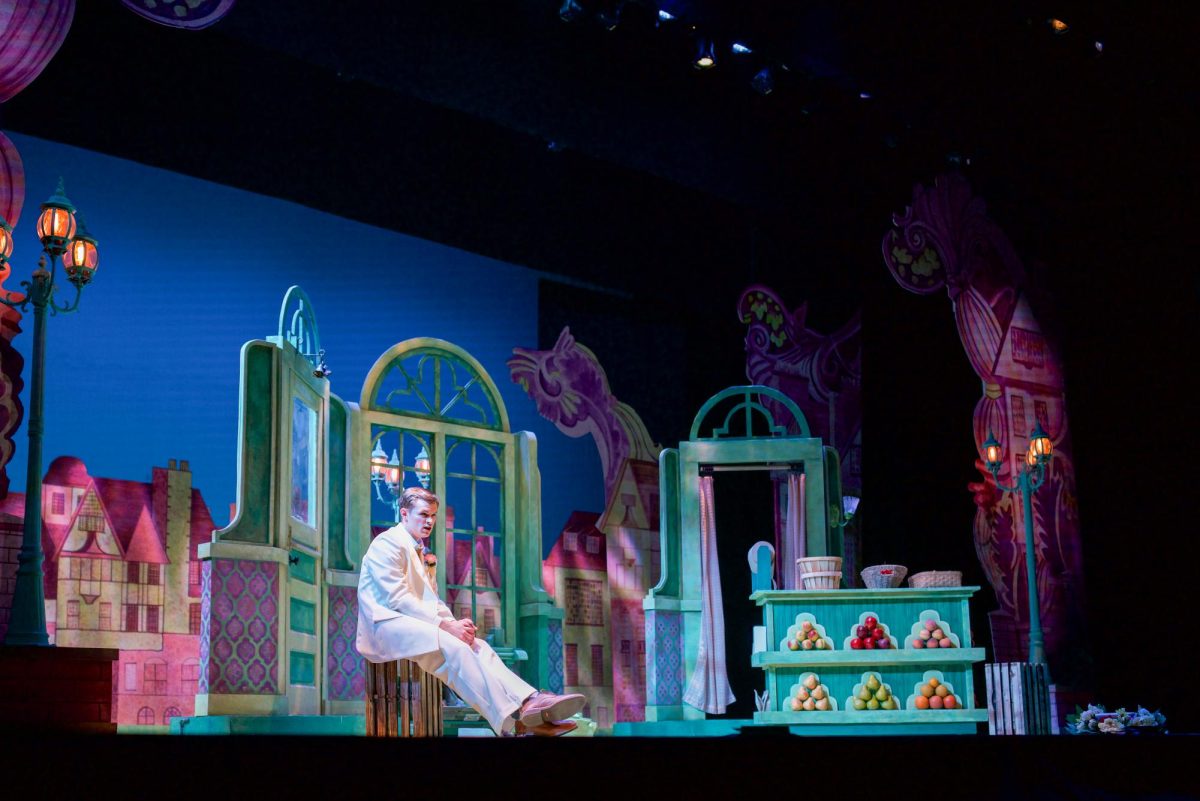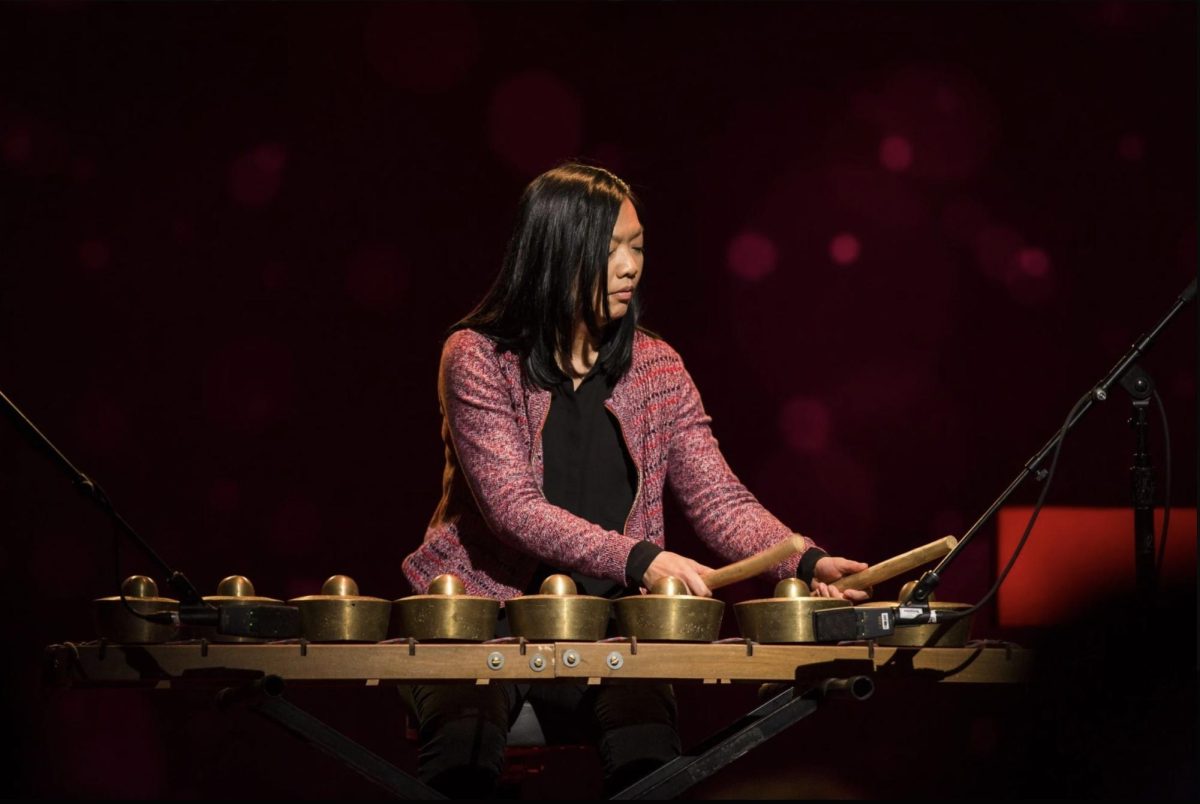From Nov. 2–4, the Oberlin Opera Theater will present Benjamin Britten’s satirical comedy Albert Herring. This production features the Oberlin Chamber Orchestra and a double cast from the Conservatory’s Vocal Studies division. This performance was directed by Visiting Assistant Professor of Opera Theater Stephanie Havey, marking her first production with the Oberlin Opera Theater. The whole piece comes alive under the baton of Michael Sakir, OC ’06.
The story takes place in Loxford, a small town in East Suffolk, England. The town folk hurry to find a new May Queen for the upcoming May Festival. Because the people of Loxford prize purity, the purest of them all wins said title. The May Queen is usually a virgin woman; however, no more virgins exist, so they must reluctantly award the May Queen title to the most virginal man in town, Albert Herring.
Havey’s set design showcased Loxford with tall pink and gold two-dimensional buildings that frame the stage and brilliantly capture the town’s rigidity with an Addams Family-esque portrayal of the town folk — pale-faced, lifeless, and morally dubious, yet somehow likable. However, the town’s youth seemed rosy-cheeked and full of life. The gothic appearance of the older townspeople in contrast with the lively color palette of its youth show that time spent within this society will surely wear away at all who abide by Loxford’s morals.
Albert Herring finds himself caught between the town’s moral rigidity and the hedonistic ways of his bully, Sid. Albert is envious of Sid’s opposition to Loxford’s morals, largely prompted by Sid’s romance with Nancy. Sid spikes the punch bowl at the May Festival and Albert succumbs to moral questioning after a fair bit of rum. We see Albert quarrel with himself until he finds who he really is — with the help of even more alcohol. This discovery is frowned upon by the townspeople, yet he finds friends in those who Loxford would consider sinners.
Our titular character, Albert Herring, is sung by Conservatory fourth-year Blake Harlson and double-degree fifth-year Peter Jeungst. Harlson’s Herring undertook the character changes subtly but convincingly and sang each phrase expertly into the hall. Harlson’s voice is best suited for gentle, melodic gestures, while still being capable of declamatory singing that captures one’s attention at a moment’s notice. Jeungst was also a marvel to watch, his movements constantly in conversation with the orchestra. He glided easily across the stage, with an effortless vocal quality to match, displaying a side of Herring that was always free. A dance-like quality allowed Jeungst’s Herring to physicalize his navigation of self-discovery in an entirely approachable way for the audience.
Lady Billows was sung by Conservatory fourth-years Elizabeth Hanje and Jordan Twadell. It’s worth seeing this show simply to hear glorious acuti sung from offstage by these two divas. Hanje’s voice was nothing short of magnificent, echoing through Hall Auditorium even from backstage. Twadell sang with an impeccable, silvery timbre throughout the entire show. She balanced powerful singing with a witty attention to detail necessary for British comedy. Twadell’s top rang Hall like a bell.
There are few truly lyrical moments in Britten’s score, yet they were made so memorable when Conservatory fourth-year Alan Rendzak wrung out all possible beauty from them. Rendzak’s voice, even at the softest dynamic, is always audible, with plenty of core — a difficult task. He floats to the top of his voice with no hesitation. Although his role as Vicar is primarily an ensemble character, his execution of the role made it worthy of great recognition. Rendzak will be singing all performance dates.
Nancy, sung by double-degree fourth-year Inayah Raheem and double-degree fifth-year Kayleigh Tolley, was a much-needed break from the extreme characters in this comedy. Raheem provided a refreshing and reasonable-minded character that goes hand in hand with a stunning vocal production and consistent clarion tone. Tolley played a noticeably flirtier Nancy; her attentive approach to text and beautiful lyric mezzo would charm just about anyone. Sparks fly between Tolley’s Nancy and Sid, sung by Conservatory fourth-year Benhur Ghezehey, whose athletic baritone and natural stage presence make for a very likable bad boy.
The ensemble characters in this show are simply a delight. At times, I felt all 13 cast members made the stage appear a little crowded. However, each singer created a nuanced presence and supportive atmosphere for their castmates. At the end of a few ensembles I couldn’t help but indulge in the beautifully cacophonous vocal writing Britten demands of these singers. Each singer, independently of anyone else on the stage, delivers their sound confidently and provides emotion in accordance with the libretto.
Sakir manned the pit, creating a space for Britten’s colors to explore Hall in a significant way. With Britten’s beautiful score, unusual implementation of piano, and auditory special effects, Sakir expertly captures Britten’s intent. Having attended only the dress rehearsal, a few tempi and entrance discrepancies were yet to be fixed; however, with this hardworking team, I have no doubts the hardworking team will resolve them. After the retirement of former Director of Opera Theater Jonathan Field, Oberlin was left with some big shoes to fill. Havey, in very Oberlin fashion, created her own pair of shoes, which I can only hope will stay in Oberlin for years to come.







